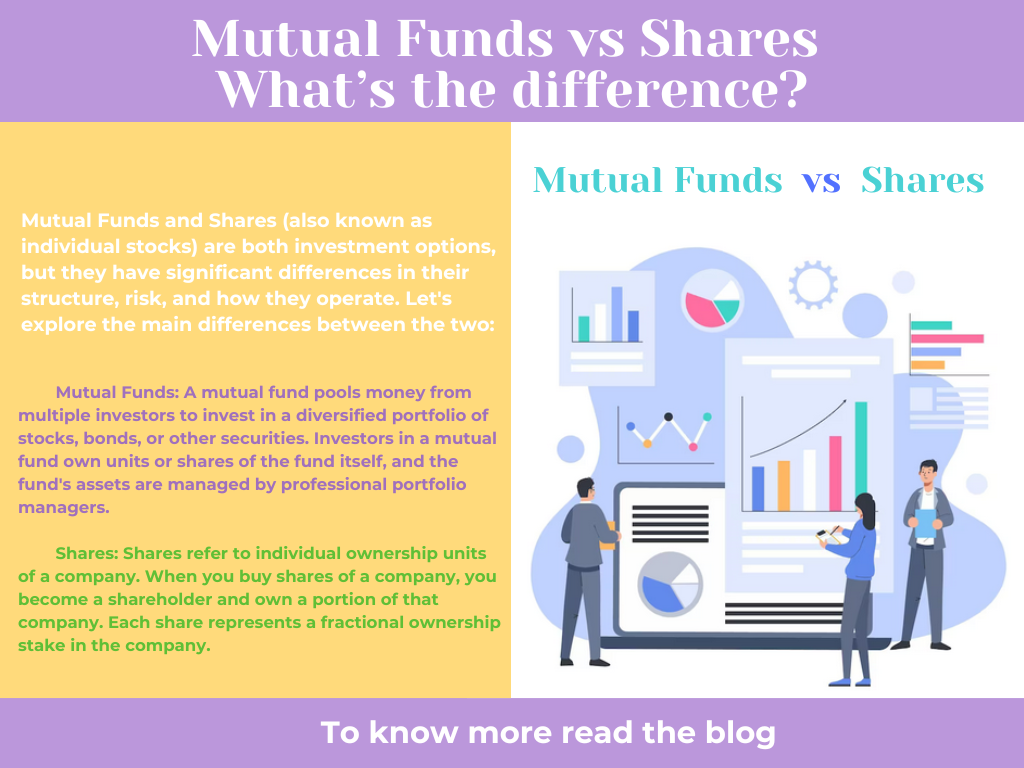Mutual Funds vs Shares: What’s the difference?
Mutual Funds and Shares (also known as individual stocks) are both investment options, but they have significant differences in their structure, risk, and how they operate. Let's explore the main differences between the two:
Structure:
Mutual Funds: A mutual fund pools money from multiple investors to invest in a diversified portfolio of stocks, bonds, or other securities. Investors in a mutual fund own units or shares of the fund itself, and the fund's assets are managed by professional portfolio managers.
Shares: Shares refer to individual ownership units of a company. When you buy shares of a company, you become a shareholder and own a portion of that company. Each share represents a fractional ownership stake in the company.
Diversification:
Mutual Funds: Mutual funds are inherently diversified because they invest in a mix of different assets. This diversification helps spread risk, as gains in some holdings may offset losses in others. Investors can gain exposure to a wide range of securities through a single mutual fund.
Shares: When you buy shares of a single company, you are exposed to the performance and risks of that specific company. If the company performs well, your investment may grow, but if it performs poorly, you may incur losses.
Risk:
Mutual Funds: The risk in mutual funds is spread across the entire portfolio of holdings, which can reduce individual company risk. However, depending on the fund's asset allocation, it may still carry risks associated with market fluctuations and the performance of the underlying assets.
Shares: Investing in individual company shares can be riskier as it depends on the company's performance and market conditions. The fortunes of a single company can have a significant impact on the value of your investment.
Management:
Mutual Funds: Mutual funds are managed by professional fund managers who make decisions on asset allocation and security selection based on the fund's investment objective.
Shares: When you own shares of a company, you don't have direct control over its management decisions. Shareholders can vote on certain company matters, but the day-to-day management is the responsibility of the company's board of directors and executives.
Liquidity:
Mutual Funds: Mutual funds can be bought or sold at the end-of-day net asset value (NAV) price, which is calculated after the market closes. They offer daily liquidity, meaning you can buy or sell your fund shares at the end of each trading day.
Shares: Individual company shares can be bought or sold during market hours through stock exchanges. They offer real-time liquidity during market hours.
Entry Investment:
Mutual Funds: Mutual funds typically have a minimum investment requirement, which can vary depending on the fund and the investment platform.
Shares: Shares can be purchased in any quantity, and the price per share is determined by the stock market.
In summary, mutual funds offer diversification, professional management, and daily liquidity, making them a popular choice for many investors seeking a diversified portfolio without having to buy individual securities. On the other hand, shares provide direct ownership and potential higher risks and rewards associated with investing in individual companies. The choice between mutual funds and shares depends on an investor's financial goals, risk tolerance, and investment preferences.


